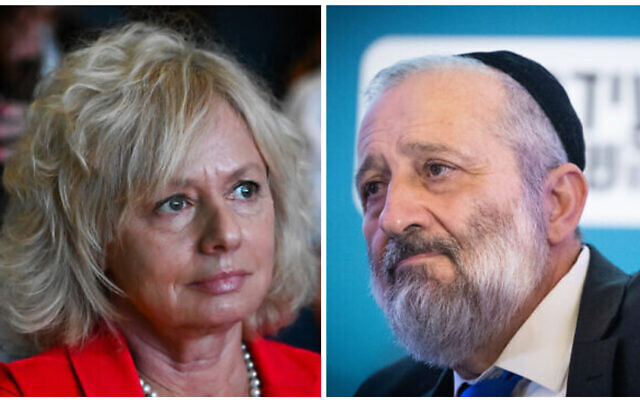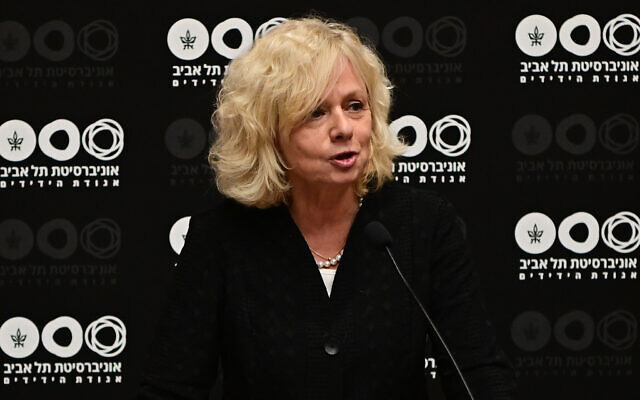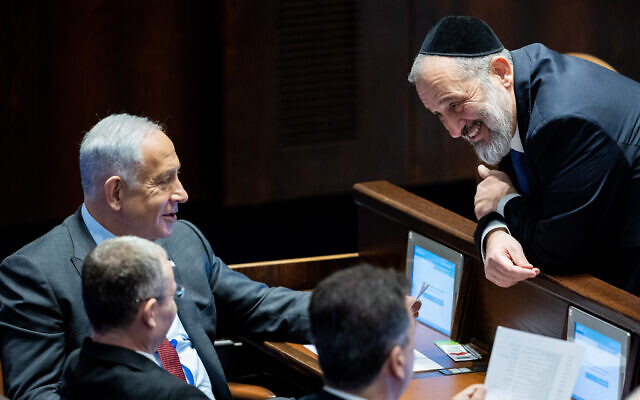Gali Baharav-Miara to reportedly argue that it’s ‘unreasonable’ for thrice-convicted Shas party head to hold cabinet post, though she will defend new law that allowed appointment

Attorney General Gali Baharav-Miara is expected to oppose the appointment of Shas party chief Aryeh Deri as a minister in the new government, according to multiple Hebrew reports on Monday.
Ahead of a Thursday hearing by an expanded panel of 11 High Court justices on petitions against Deri’s appointment as health and interior minister, Baharav-Miara will reportedly submit a legal opinion saying the nomination is unreasonable for someone who has been convicted three times in the past, including last year.
If the court ends up accepting that opinion, Prime Minister Benjamin Netanyahu will be forced to fire Deri from his cabinet posts. The ultra-Orthodox party leader was sworn in last week as both interior and health minister.
In response to separate petitions, Baharav-Miara will, however, defend the new government’s recently passed legislation that enabled Deri’s appointment — a law change clarifying that those who have received suspended sentences in the previous seven years — unlike those who received custodial jail sentences — can become ministers.
While she originally opposed this amendment, she has since said that the state cannot argue the legislation is illegal.
Her legal opinion on the appointment of Deri is expected to cite a ruling by Supreme Court Chief Justice Esther Hayut from 2015 that found that his appointment as economy minister at the time was borderline legal, as more than seven years had passed since he was behind bars.

Baharav-Miara’s legal opinion will likely argue that the prospect of someone who has been convicted three times (in 1999, 2003 and 2022) and whose last conviction was just a year ago, being again appointed minister is unreasonable, even though the recently passed legislation allows it. (Deri pleaded guilty to tax offenses and was given a suspended sentence last year as part of a plea bargain. The judge agreed to the plea bargain on the assurance that Deri was retiring from public life.)
According to the Ynet news site, Baharav-Miara will allow Netanyahu to appoint a private lawyer to represent him before the court on the matter, in light of the prime minister’s insistence on Deri’s appointment and her opposition to it.
This would be a rare but not unprecedented step, with the state’s stances usually communicated to the court solely via the attorney general, who also serves as legal adviser to the government.
The report said that at Thursday’s hearing, Netanyahu will be represented by attorney Michael Rabilo, who also represented him two years ago in petitions that sought and failed to block his appointment as prime minister amid his ongoing corruption trial.
Rabilo was also a chief negotiator for Netanyahu’s Likud party in recent coalition talks.
All parties in the new coalition have pledged support for the legislation of a so-called “override clause” that would let the Knesset reinstate laws and government decisions struck down by the High Court as breaching Israel’s quasi-constitutional Basic Laws. Some in Likud have indicated that if the High Court bars Deri from serving as a minister, the “override” legislation would be accelerated.
The new justice minister, Likud’s Yariv Levin, vowed earlier this year to end “rule by judges.”
Last week, the High Court rejected a petition filed by the Movement for Quality Government in Israel that demanded the court issue a temporary injunction halting the planned swearing-in of Netanyahu’s government last Thursday over Deri’s expected nomination as a minister.
The petition argued that Deri had manipulated the court and that Netanyahu “chose not to turn to the Central Elections Committee” to rule on the matter, as Baharav-Miara had recommended, but instead allowed the incoming coalition to legislate a law retroactively that would allow the Shas head’s appointment. It asked that Netanyahu be forced to turn to the court to seek approval for Deri’s appointment.
While the court ruling ordered Netanyahu and Deri to respond to the petition by January 4, the ruling said that petition was “premature” and did not justify preventing the establishment of the government.

Baharav-Miara has voiced strong concerns regarding the new coalition’s intention to radically overhaul the legal and judicial system.
In an “unusual” incident, as described by a source within the Justice Ministry, the attorney general was not invited to the first cabinet meeting of the new government last week.
This came in the wake of reports of members of the new government vowing to reform the attorney general’s position by splitting it into two, with one official in charge of the state prosecution, and another serving as legal adviser to the government. Netanyahu and Baharav-Miara met for talks on Sunday.
As reported by The Times of Israel
